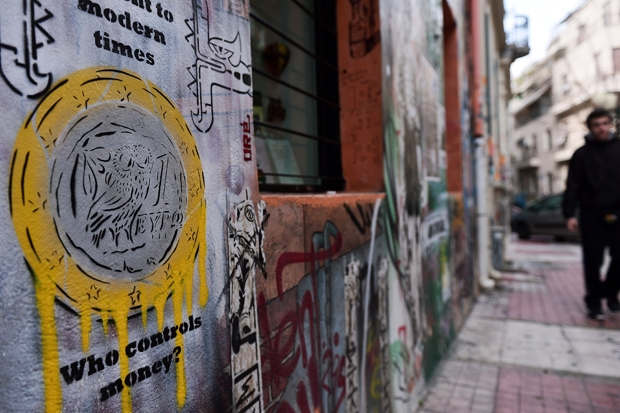‘Will Greece exit the eurozone in 2015?’ Paddy Power was pricing ‘yes’ at 3-to-1 on Tuesday, with 5-to-2 on another Greek general election within the year and 6-to-4 on the more cautious ‘Greece to adopt an official currency other than the euro by the end of 2017.’ I’m no betting man — as I reminded myself after backing a parade of point-to-point losers on Sunday — and I defer to our in-house speculator Freddy Gray, who will offer a wider guide to political bets worth having in the forthcoming Spectator Money (7 March).
But on the Greek card I’m tempted by the longer odds on the shorter timeframe, because this has the feeling of a crisis that’s close to denouement, and because prime minister Tsipras and tieless finance minister Varoufakis are wannabe revolutionaries (‘latter-day Trotskyites’, as Ken Clarke called them) rather than responsible national leaders. The pro-European Clarke says ‘I can’t see how you can sensibly avoid the Greeks defaulting and having to leave the eurozone,’ while former US Federal Reserve chairman Alan Greenspan — always worth listening to, despite the post-crash fall of his previously godlike reputation — says, ‘It’s just a matter of time before everyone recognises that parting is the best strategy.’
Perhaps even more illuminating is the Irish commentator Fintan O’Toole’s proposed T-shirt slogan ‘We are not Greece’, signifying a lack of solidarity with Greek anti-austerity demands on the part of Ireland, which has gone through austerity and come out the other side. That’s the tone of mainstream opinion in Portugal and Spain too, despite noises off from the left. A White House official most of us had not heard of before, deputy national security adviser Caroline Atkinson, has been one of the few international voices urging compromise.
The truth is that this is no longer widely seen as a case of Germany being selfishly brutal to Greece. Rather, we’re watching a Greek regime behaving like student occupiers threatening to torch the university unless their wildly unrealistic demands are met. Pretty soon, the vice-chancellor will have to stop trying to talk sense into them through a megaphone, and the monetary riot police will have to move in. Greek rejection of the latest EU deadline proposal as ‘absurd’ was surely a signal to put the water cannons on standby. I’d be astonished if sherpas from Brussels, the IMF, the European Central Bank and other key institutions are not closeted in a basement in Basel or Frankfurt at this very moment, working out how to limit Grexit damage. In the words of Damon Runyan, oft quoted here by my predecessor Christopher Fildes: ‘The race is not always to the swift, nor the battle to the strong, but that’s the way to bet.’
Big spenders
Falling oil prices don’t seem to have put any brake on the spending power of the Qataris, on whom this column keeps a wary eye. Despite my warning about ‘the curse of Canary Wharf’, the Qatar Investment Authority succeeded last month in a £2.6 billion bid for control of Songbird, holding company of the Docklands business estate. Two days later came news of the purchase of a 10 per cent stake, worth £1.1 billion, in International Airlines Group, parent of British Airways and Iberia and current bidder for Aer Lingus.
As for their London property portfolio, excavation is at last in progress on the troubled Chelsea Barracks site, where permission for a 74-apartment scheme was finally secured after seven years’ wrangling. And one of the emir’s wives recently bought three mansions in Cornwall Terrace, Regent’s Park, to convert into a single £200 million family home. Perhaps that’s where they will hang Gauguin’s ‘Nafea Faa Ipoipo’ — which is believed to have been bought by Qatar Museums, run by one of the emir’s sisters, for almost £200 million — alongside Cézanne’s ‘The Card Players’, picked up three years ago for £160 million.
I suppose we must accept the line promoted by Boris Johnson — who once called himself ‘mayor of the eighth emirate’ — that all inward investment is good, and spending on this scale is a huge vote of confidence in the UK, even if it distorts prices and creates ghettoes of extreme wealth in our capital. And I suppose we must accept assurances from the emir, Sheikh Tamim bin Hamad Al Thani, that his regime is keeping close watch (or encouraging CIA satellites to do so) on other Qataris such as Khalifa Muhammad Turki al-Subaiy and Abd al-Rahman bin Umayr al-Nuaymi, both reported last year to be living freely in the capital Doha and identified by the US government as big spenders not on townhouses and artworks but on support for Isis and al-Qaeda.
A wider search of recent news stories yields ‘Qatari businessmen to visit Ukraine’, ‘Ethiopia seeks Qatari investment’, and ‘Slovenia eyes Qatari cash for ailing airline’, while an older item speak of Qatari stakes in French companies and real estate as ‘a love story’. So we’re not so special after all — and if the emir is so promiscuous, perhaps he should do Europe a timely service by buying a portfolio of palaces and banks in Athens.
Sweet story
A salute to Michele Ferrero, the Italian confectioner who has died aged 89. His name was known in Britain only for Ferrero Rocher chocolates, with their splendidly kitch ‘Ambassador’s reception’ television ads — but he created several other enduring brands, including Nutella, Tic Tacs and Kinder Eggs, within a tightly controlled family business whose success made him Italy’s richest man, with a €20 billion fortune. His secret ingredient was hazelnuts — cheaper than cocoa as a base for sweet Nutella paste — and his secret of corporate longevity was to shun publicity and stay out of the takeover arena, whether as buyer or seller. For that reason he vetoed a bid in 2009 for Cadbury — which fell to Kraft instead. What a shame: he would have been a far more congenial new owner of that historic brand.







Comments